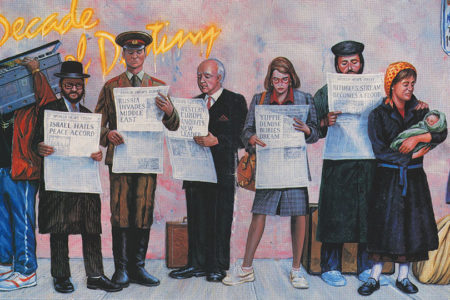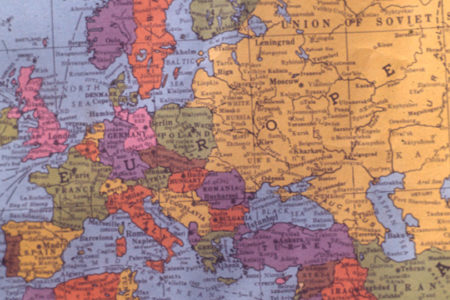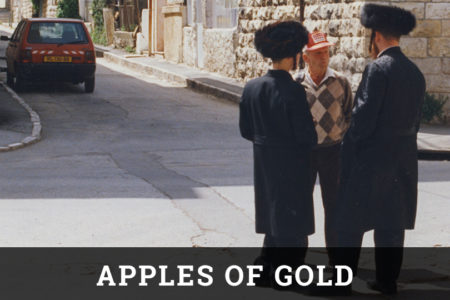The Fatal Vision Amos 7:1–17
Welcome to the decade of the 90s! Countdown to the year 2000 has already begun. The futurist is busy forecasting sweeping global changes, precipitated by perestroika and glasnost, which he believes will bring worldwide peace and prosperity. Other prognosticators view such changes as only cosmetic, a ploy to bring material prosperity to the eastern bloc who is still bent on world domination.
When it comes to predicting the future, psychics and astrologers have always had faulty vision. For example, in 1985 it was said, “Of 500 specific predictions made by the nation’s leading psychics and astrologers, only 24 of them [less than 5 percent] actually happened as the psychics said they would, and 526 [more than 95 percent] failed to come to pass. Furthermore, all the psychics and astrologers missed the 25 major news events of 1985.” One thing is sure, these psychics and astrologers did not have a true prediction of the future. In fact, such visionaries are condemned by God (Dt. 13:1–11; 18:9–14).Vibrant Life, July 8, 1986.
Yet, a small group of prophets in Israel called by God did enumerate a number of future events which would come to fruition. For example, the Prophet Amos was given a vision concerning the future demise of Israel. In the final section of his book Amos recorded five such visions, four of which begin with the words, “Thus hath the Lord GOD shown unto me” (7:1, 4, 7; 8:1). Three of the five fatal visions are recorded in chapter seven.
The Vision of Plague
God gave a vision to Amos, showing him a great horde of locusts which He was preparing to send upon Israel. Amos prophesied that the plague would come, “in the beginning of the shooting up of the latter growth; … after the king’s mowings” (v. 1). It was customary for the king to tax the people by taking the first cutting of the hay crop to feed his own livestock. The “latter growth” was kept by the people as fodder for their own animals.
Amos pictured the plague taking place after the farmer’s winter crop was depleted, when he was in need of the final growth to feed his livestock. When the locusts had “ceased eating the grass of the land” (v. 2), there would remain no vegetation for either man or animal. Although this is referring to a literal plague of locusts descending on Israel, it is symbolic of the great destruction which would come at the hands of the Assyrians.
Amos pled with the Lord to spare the nation: “O Lord Gᴏᴅ, forgive, I beseech thee. By whom shall Jacob arise? For he is small” (v. 2). The prophet’s petition was not based on Israel’s goodness, for they were guilty and deserved judgment, but he appealed to God’s grace for survival.
God responded to the prophet’s plea with a promise “The Lᴏʀᴅ repented for this. It shall not be, saith the Lᴏʀᴅ” (v. 3). What does it mean that God “repented”? How can a perfect God repent? Does God change His mind? A distinction must be made between God’s attire, character, and action toward man. God’s attributes work together in perfect harmony; they cannot contradict each other. It cannot be aid that God changes His purpose or mind when it comes to bringing judgment on sin. But God will change His action (withhold judgment) hen a person or nation truly repents. Therefore, repentance on God’s part involves a proper divine reaction to man’s sin; that is, God will either extend mercy or judgment. God honored Amos’ intercessory prayer by showing mercy to Israel. He withheld His hand of judgment, thus giving the nation more time to repent of her sin.
A number of principles concerning God’s judgment can be drawn from this text. First, God does hear those who intercede for a nation; thus He may act upon the prayers of His people on behalf of that nation. Second, the Lord longs to extend grace, not judgment, to a people who put away sin. Third, even though judgment on a nation may be imminent, God will often divert His judgment, giving the nation more time to turn from their sin.
The Vision of Fire
In the second vision, Amos was shown a plague of fire that threatened to destroy the whole land. The Lord “called to contend by fire” (v. 4) that is, He brought forth the fire to judge Israel. The fire would devour “the great deep” (v. 4) or dry up the underground rivers that fed the earth. It also would “eat up a part” (v. 4) or dry up the land allotted to Israel. Here is a picture of severe drought which God was ready to send upon the land in judgment.
Once again Amos interceded for Israel, pleading with God to stop this horrible plague. “Cease, I beseech thee. By whom shall Jacob arise? For he is small.” (v. 5). God again repented and answered the prophet’s plea with a promise: “This also shall not be” (v. 6). Notice, God does respond to the prayers of His people to delay coming judgment.
The Fatal Vision
Amos was given a third vision, that of a “plumb line” (v. 7). The Lord is pictured standing on a wall with a plumb line in His hand to determine the vertical straightness of the wall (v. 7).
Israel had been plumbed correctly when originally forged into a nation (Ex. 19:7–8; 24:3, 7), but over the centuries she had become unaligned with God’s upright law. The Lord is portrayed as a surveyor measuring to what degree Israel is out of plumb (v. 8). After proper testing, God had no alternative but to destroy Israel who was structurally unsound. The Lord informed Amos that he need not make intercession for Israel since His patience with the nation had been exhausted. God would “not again pass by them any more” (v. 8), meaning He would not divert or delay the determined judgment scheduled to come upon them.
First, God would destroy Israel’s religious structure: “the high places of Isaac shall be desolate, and the sanctuaries of Israel shall be laid waste” (v. 9). Those shrines which had been set up in Bethel, Dan, and along the hillsides of Israel would be totally destroyed. Second, the political structure would be destroyed. God would “rise against the house of Jeroboam with the sword” (v. 9). Notice, Amos did not declare that Jeroboam would perish by the sword (cp. 2 Ki. 14:23–29) but that his descendants would. A prophecy was given to Jehu (in the line of Jeroboam I) indicating that his descendants would reign only four generations (2 Ki. 10:30). This prophecy was fulfilled when Zechariah, the son of Jeroboam II, was slain by Shallum (2 Ki. 15:8–10), cutting off the house of Jeroboam from Israel.
Someone has rightly said, “God’s patience, long sinned against, will at length, be sinned away.” When God’s patience is exhausted with a sinning nation, intercessory prayer on behalf of that nation is to no avail.
The Vision Mocked
When Amos spoke of the religious and political destruction of Israel, he hit a nerve which inflamed both Amaziah the priest and King Jeroboam (v. 10), for the temple of Bethel was where Jeroboam II worshiped. More importantly, it was the religious symbol which inspired the people to support his dynasty. To denounce Bethel and its religious system (cp. 3:14; 4:4–5; 5:5–6, 21–26; 7:9; 9:1) was tantamount to attacking Jeroboam’s reign.*
Amaziah shrewdly responded by sending a delegation to the palace to charge Amos before the king. First, he charged Amos with conspiring to turn the people against Jeroboam (v. 10). Second, he charged that Amos was plotting the king’s death and the captivity of Israel (v. 11). Third, he warned Jeroboam that “the land is not able to bear all his words” (v. 10). In other words, the people might believe Amos and bring revolution against the king. These charges were all a distortion of Amos’ message. Notice, Amaziah did not mention that Amos had called for Israel to turn away from religious apostasy; neither did he mention the prophet’s supplicating prayer for Israel’s survival.
The king never acted upon Amaziah’s charges. Perhaps he did not feel threatened because of his power and political security. Perhaps he considered Amos a crackpot prophet. Perhaps he considered Amos a true prophet and feared to take action against him. Perhaps he did not want to stir up controversy in Israel. Like many political leaders today, the king simply ignored God’s messenger and message.
Upon receiving no consideration from the king, Amaziah confronted Amos personally. In a sarcastic tone, he advised Amos, “O thou seer, go, flee away into the land of Judah, and there eat bread, and prophesy there” (v. 12). The phrase “eat bread, and prophesy” pictured Amos as a hireling prophet who made a living by selling his services (Mic. 3:5–11).* Notice, Amaziah was a hireling priest who projected his own lifestyle on Amos.
Amaziah commanded Amos to leave Bethel for two reasons. First, it was the “king’s sanctuary” (v. 13) where only the king’s prophets and priest could minister. Second, it was the “king’s court” (v. 13), his residence, where Amos had no right to be. In today’s vernacular, Amaziah was saying, Get out of here, you have no right to the king’s city, altar, or house! Go back to Judah, and prophesy all you want at your own national altar!
Amaziah is an example of many religious leaders who are spiritually blind, unable to discern the truth of God’s messenger.
Amos denied any professional standing as a career prophet: “I am no prophet, neither am I a prophet’s son” (v. 14). It was God who had chosen and called him from the occupation of a “herdsman, and a gatherer of sycamore fruit” (v. 14) to prophesy against Israel. It is very possible that Amos was a sheep breeder and had a sideline of growing sycamore fruit in the Jordan Valley. The term gathering (v. 14) referred to Amos climbing the sycamore tree and pinching the maturing fruit so it could ripen. In all likelihood, Amos was a rugged, out-of-doors type man, quite different from the society of Israel to whom he was called to minister.
God had commissioned Amos while he was busily engaged in secular employment: “And the LORD took me as I followed the flock, and … said … Go, prophesy unto my people, Israel” (v. 15). He had no alternative than to obey God’s call even though a corrupt priest like Amaziah might not like his message.
A number of contrasts can be made concerning his chosen profession and God’s call. First, Amos did not seek the ministry: “I am no prophet … I am an herdsman” (v. 14); it was the Lord who “took me” (v. 15). Second, Amos did not select his mission: “the Lᴏʀᴅ said unto me, Go … unto my people, Israel” (v. 15). Third, Amos did not speak his own message, he was given what God wanted Israel to hear: “Now … hear the word of the Lᴏʀᴅ” (v. 16). Fourth, he was not to be scared of man’s opposition; he spoke boldly to Amaziah the priest (v. 17).
There is a parallel between Amos’ call and that of the apostles. The Lord called the apostles from secular employment and commanded them to take His message to the lost sheep of Israel. They, too, had to face the opposition of Israel’s high priest. They, too, were faithful in obeying God’s commission to preach God’s message. They, too, did not allow the prohibition of the priests (Acts 5:28–29) to keep them from doing the work God had called them to do.
The Vision Described
Since Amaziah had rebelled against God’s prophecy, he would suffer four personal tragedies. First, his wife would become a prostitute, a “harlot in the city” (v. 17), where one she had held a position of prominence.* As Amaziah had been unfaithful to the Lord, so his wife would be unfaithful to him. Second, his posterity would be killed: “thy sons and thy daughters shall fall by the sword” (v. 17). Amaziah’s name would be cut of in Israel. Third, his property would be “divided by line” (v. 17) and given to foreigners. Fourth, the priest would “die in a polluted [unclean] land” (v. 17). He would be stripped of his priesthood and position and exiled to a foreign land where he was totally engulfed in paganism until his death.
Had the nation of Israel heeded Amos’ message, put away their idolatry, and turned to God, they would have been spared. But the prophet’s message was totally ignored; thus Israel would “go into captivity” (v. 17). God’s patience had run its course; His determined judgment was ready to fall upon the nation.
God’s message to Israel through the Prophet Amos should be heeded by the United States. Our country was once a strong nation built on the principles of God’s Word, but, like Israel, she has drifted into the dark waters of decay and decadence. The moral decline in the United States is shocking. Easy divorce, family breakdown, abortion on demand, sexual immorality of every sort, acceptance of perverted art as a right of free expression, proliferation of illegal drugs, the liberal interpretation of laws through the court system against godly causes—all these indicate where this country is headed. One does not need to be a prophet to predict the impact such trends will have upon the survival of America.
In November 1989 President Bush predicted that the 1990s would be a “Decade of Democracy” worldwide. More likely, it will be a “Decade of Destiny.” The handwriting is on the wall. The world is on a collision course as nations are being moved into place for end-time prophecy to be fulfilled.
God has been gracious in diverting and delaying judgment on America, but if repentance is not forthcoming, the cherished democracy which we have enjoyed for 213 years might be a dim memory by the year 2000.








I Love such a wonderful analysis of the Word of God.
May God continue to use you mightily.